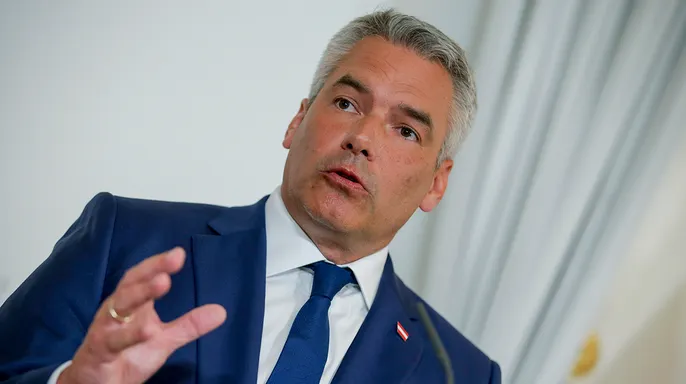Austria’s political landscape is on the cusp of a historic shift as the far-right Freedom Party eyes a potential first-time win in the upcoming national election. With voter concerns ranging from immigration to inflation and the ongoing war in Ukraine, the Freedom Party has surged in popularity, capturing the attention of citizens and critics alike.
Rising Support and a Tight Race
Recent polls indicate that the Freedom Party has garnered 27% of voter support, positioning it as a contender in a tight race against the conservative Austrian People’s Party (ÖVP) led by Chancellor Karl Nehammer, which has 25% support, and the center-left Social Democrats with 21%. A win for the Freedom Party could mark a significant moment in Austria’s political history. However, Herbert Kickl, the party’s leader, faces the challenge of securing a coalition partner to achieve a majority in the lower house of parliament.
Herbert Kickl: A Controversial Leader
Herbert Kickl, the Freedom Party’s leader since 2021, has campaigned to become Austria’s new chancellor, describing himself as a “Volkskanzler,” or chancellor of the people—a term controversially associated with Nazi-era rhetoric. Despite the parallels, Kickl has firmly rejected such comparisons. According to Gernot Bauer, a journalist with the Austrian magazine *Profil*, “Under Kickl’s leadership, the Freedom Party has moved even further to the right.” Bauer further notes that Kickl’s style is “aggressive” and deliberately provocative.
Key Issues: Immigration, Inflation, and Safety Concerns
The Freedom Party has capitalized on voters’ dissatisfaction with economic challenges, including high inflation, which has averaged 4.2% over the past year, surpassing the EU average. The party’s rhetoric has resonated with many Austrians, who feel the current government has not adequately addressed their concerns. Margot Sterner, a 54-year-old attendee at a recent campaign event, said, “You don’t feel safe in your own country anymore. But then you’re being branded as right-wing just because you think about the safety of your people, the kids and women.”
The party’s election platform emphasizes stricter immigration controls and proposes a “remigration of uninvited foreigners” to create a more “homogeneous” society. Additionally, the Freedom Party advocates an end to sanctions against Russia and criticizes Western support for Ukraine.
Challenges for the People’s Party and Nehammer
The Austrian People’s Party, currently leading a coalition with the Greens, has experienced a decline in popularity since the 2019 election. Although Chancellor Nehammer has attempted to position his party as “the strong center” capable of managing crises, recent events like the COVID-19 pandemic and Russia’s invasion of Ukraine have strained his leadership.
Nehammer’s campaign also faces criticism for the government’s controversial vaccine mandate in 2022, which was introduced and then scrapped without implementation. Political analyst Peter Filzmaier explained that these crises and economic challenges have “cost the conservatives support.”
Potential Coalition Scenarios
Any party will likely need a coalition to form a government. Nehammer has made it clear that while he would not join a government led by Kickl, he has not ruled out a coalition with the Freedom Party altogether. Filzmaier believes the chances of Kickl accepting such a coalition without holding a significant position are low. However, if the People’s Party finishes first in the election, an alliance between the two parties could be on the table.
Alternatively, a coalition between the People’s Party, the Social Democrats, and the liberal Neos could provide another pathway to forming a government. Andreas Babler, leader of the Social Democrats, has positioned himself against the far-right, calling Kickl “a threat to democracy” and ruling out any partnership with the Freedom Party.
A Defining Moment for Austria
Austria’s upcoming election represents a critical juncture for the nation, with significant implications for its future direction. As voters head to the polls, they face a choice that could redefine Austria’s political landscape and its stance on immigration, economic policy, and international relations. Whether the Freedom Party can secure a historic victory or if the current government can retain power remains to be determined. Still, the outcome will undoubtedly shape Austria’s trajectory in the future.







